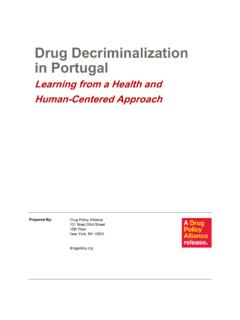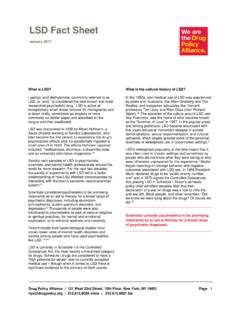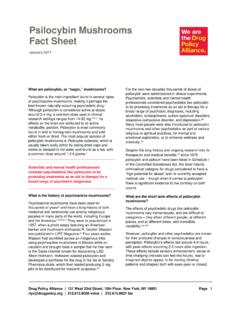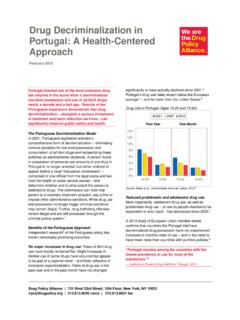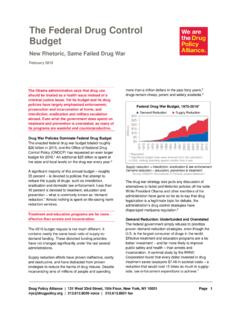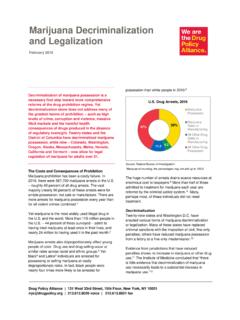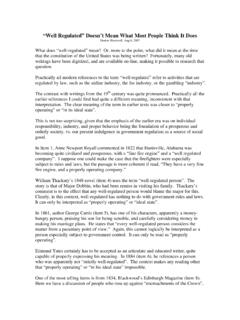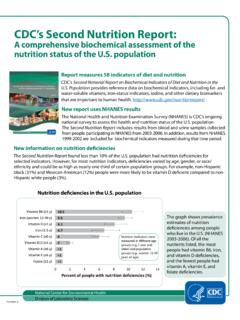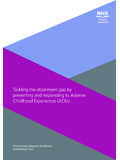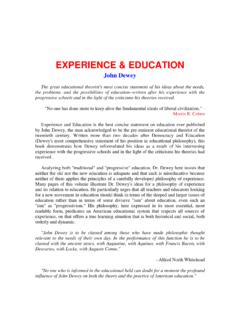Transcription of The Drug War, Mass Incarceration and Race
1 Drug Policy Alliance | 131 West 33rd Street, 15th Floor, New York, NY 10001 | voice | fax The Drug War, Mass Incarceration and Race January 2018 With less than 5 percent of the world s population but nearly 25 percent of its incarcerated population,1 the United States imprisons more people than any other nation in the world largely due to the war on drugs. Misguided drug laws and harsh sentencing requirements have produced profoundly unequal outcomes for people of color. Although rates of drug use and sales are similar across racial and ethnic lines, Black and Latino people are far more likely to be criminalized than white Source: International Centre for Prison Studies, World Prison The Drug War Drives Mass Incarceration and Racial Disparities in Judicial Systems There were more than million drug arrests in the in 2016.
2 The vast majority more than 80 percent were for possession At year-end 2015, 15 percent of all people in state prison were incarcerated for a drug law violation of whom 44,700 were incarcerated for possession alone. Forty-seven percent of people in federal prisons and more than half of the female federal population are incarcerated for drug law Almost 500,000 people are behind bars for a drug law violation on any given night in the United States6 ten times the total in Source: Federal Bureau of Investigation, Uniform Crime Reports. 8 Drug law violations have been the main driver of new admissions to prison for decades. An analysis by Brookings Institution found that there were more than 3 million admissions to prison for drug offenses between 1993 and 2009 in the United States.
3 In each year during that period, more people were admitted to prisons for drug law violations than violent crimes. During that same timeframe, there were more than 30 million drug people of color experience discrimination at every stage of the judicial system and are more likely to be stopped, searched, arrested, convicted, harshly sentenced and saddled with a lifelong criminal record. This is particularly the case for drug law violations. Black people comprise 13 percent of the population,10 and are consistently documented by the government to use drugs at similar rates to people of other But Black people comprise 29 percent of those arrested for drug law violations,12 and nearly 40 percent of those incarcerated in state or federal prison for drug law Similarly, Latinos make up 18 percent of the population, but comprise 38 percent of people 335376101114118130162319434430666 IndiaSwedenGermanyFranceCanadaChinaSpain AustraliaBrazilRwandaRussiaUSAW orld Incarceration RatesIncarcerationRate Per100,0000500,0001,000,0001,500,0002,00 0, Drug Arrests, 1980-2016 PossessionSales 2 Drug Policy Alliance | 131 West 33rd Street.
4 15th Floor, New York, NY 10001 | voice | fax Page incarcerated in federal prisons for drug In 2013, Latinos comprised almost half (47 percent) of all cases in federal courts for drug National-level data on arrests of people of Latino ethnicity are incomplete. Yet among drug arrest incidents in 2015 in which ethnicity was reported, more than 20 percent of those arrested were State and local level data show that Latinos are disproportionately arrested and incarcerated for drug possession Nearly 80 percent of people in federal prison and almost 60 percent of people in state prison for drug offenses are Black or Sources: Census Bureau; Bureau of Justice Widely adopted in the 1980s and 90s, mandatory minimum sentencing laws have contributed greatly to the number of people of color behind Research shows that prosecutors are twice as likely to pursue a mandatory minimum sentence for Black people as for white people charged with the same Among people who received a mandatory minimum sentence in 2011, 38 percent were Latino and 31 percent were Mass Incarceration Destroys Families million children are growing up in households in which one or more parents are incarcerated.
5 Two-thirds of these parents are incarcerated for nonviolent offenses, including a substantial proportion who are incarcerated for drug law violations. One in nine Black children has an incarcerated parent, compared to one in 28 Latino children and one in 57 white Collateral Consequences of Mass Incarceration Punishment for a drug law violation is not only meted out by the criminal justice system, but is also perpetuated by policies denying child custody, voting rights, employment, business loans, licensing, student aid, public housing and other public assistance to people with criminal convictions. Criminal records often result in deportation of legal residents or denial of entry for noncitizens trying to visit the Even if a person does not face jail or prison time, a drug conviction often imposes a lifelong ban on many aspects of social, economic and political Source: Bureau of Justice Statistics, Nothing has contributed more to the systematic mass Incarceration of people of color in the United States than the War on Drugs.
6 Michelle Alexander, The New Jim Crow (2010). Such exclusions permanently relegate millions of Americans to second-class status, disproportionately people of color. One in 13 Black people of voting age are denied the right to vote because of laws that disenfranchise people with felony Policy Recommendations 1. Decriminalize drug possession, removing a major cause of arrest and Incarceration of primarily people of color, helping more people receive drug treatment and redirecting law enforcement resources to prevent serious and violent crime. 2. Eliminate policies that result in disproportionate arrest and Incarceration rates by changing police practices, rolling back harsh mandatory minimum sentences, and repealing sentencing disparities.
7 3. End policies that exclude people with a record of arrest or conviction from key rights and opportunities. These include barriers to voting, employment, public housing and other public assistance, loans, financial aid and child custody. 0%10%20%30%40%50%60%70% PopulationPeople in StatePrison for DrugOffensesPeople in FederalPrison for DrugOffensesDisproprotionate Impact of Drug Laws on Black and Latino CommunitiesWhiteLatinoBlack0500100015002 0002500 Rate Per 100,000 State and Federal Adult Incarceration Rates, December 31, 2016 WhiteLatinoBlack 3 Drug Policy Alliance | 131 West 33rd Street, 15th Floor, New York, NY 10001 | voice | fax Page 1 Roy Walmsley, World Population List, 10th ed.
8 (London: International Centre for Prison Studies, 2013); National Research Council, The Growth of Incarceration in the United States: Exploring Causes and Consequences (Washington, : The National Academies Press, 2014). 2 Substance Abuse and Mental Health Services Administration, "Results from the 2015 National Survey on Drug Use and Health," (Rockville, MD: Substance Abuse and Mental Health Services Administration, 2015), Table ; Jamie Fellner, Decades of disparity: drug arrests and race in the United States (Human Rights Watch, 2009); Meghana Kakade et al., "Adolescent Substance Use and Other Illegal Behaviors and Racial Disparities in Criminal Justice System Involvement: Findings From a National Survey," American Journal of Public Health 102, no.
9 7 (2012). While national arrest data by ethnicity are not systematically collected and are therefore incomplete, state-level data show that Latinos are disproportionately arrested for drug offenses. Drug Policy Alliance and Marijuana Arrest Research Project, "Race, Class and Marijuana Arrests in Mayor de Blasio's Two New Yorks: the 's Marijuana Arrest Crusade Continues in 2014," (2014) ; California Department of Justice, "Crime in California 2013," (2014). 3 International Centre for Prison Studies, World Prison Brief, (2015). 4 Federal Bureau of Investigation, "Crime in the United States, 2015," (Washington, DC: Department of Justice, 2016). 5 E. Ann Carson, "Prisoners in 2016," (Washington, DC: Department of Justice, Bureau of Justice Statistics, 2017).
10 6 Ibid; Peter Wagner and Bernadette Rabuy, "Mass Incarceration : The Whole Pie 2017," (Prison Policy Initiative, 2017) ; Doris James, "Profiles of Jail Inmates, 2002," in Special Report (Washington, DC: United States Department of Justice, Bureau of Justice Statistics, 2004) 7 Peter Reuter, "Why Has US Drug Policy Changed So Little over 30 Years?," Crime and Justice 42, no. 1 (2013); National Research Council, The Growth of Incarceration in the United States: Exploring Causes and Consequences. 8 Federal Bureau of Investigation, Uniform Crime Reports; Bureau of Justice Statistics, Arrest Data Analysis Tool; Federal Bureau of Investigation, "Crime in the United States, 2016." ; Data obtained through a request to the Federal Bureau of Investigation, Criminal Justice Information Services Chief Multimedia Productions, Stephen G.

